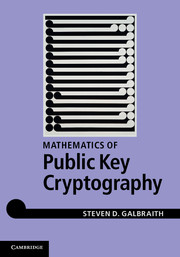Book contents
- Frontmatter
- Contents
- Preface
- Acknowledgements
- 1 Introduction
- PART I BACKGROUND
- PART II ALGEBRAIC GROUPS
- PART III EXPONENTIATION, FACTORING AND DISCRETE LOGARITHMS
- 11 Basic algorithms for algebraic groups
- 12 Primality testing and integer factorisation using algebraic groups
- 13 Basic discrete logarithm algorithms
- 14 Factoring and discrete logarithms using pseudorandom walks
- 15 Factoring and discrete logarithms in subexponential time
- PART IV LATTICES
- PART V CRYPTOGRAPHY RELATED TO DISCRETE LOGARITHMS
- PART VI CRYPTOGRAPHY RELATED TO INTEGER FACTORISATION
- PART VII ADVANCED TOPICS IN ELLIPTIC AND HYPERELLIPTIC CURVES
- Appendix A Background mathematics
- References
- Author index
- Subject index
15 - Factoring and discrete logarithms in subexponential time
from PART III - EXPONENTIATION, FACTORING AND DISCRETE LOGARITHMS
Published online by Cambridge University Press: 05 June 2012
- Frontmatter
- Contents
- Preface
- Acknowledgements
- 1 Introduction
- PART I BACKGROUND
- PART II ALGEBRAIC GROUPS
- PART III EXPONENTIATION, FACTORING AND DISCRETE LOGARITHMS
- 11 Basic algorithms for algebraic groups
- 12 Primality testing and integer factorisation using algebraic groups
- 13 Basic discrete logarithm algorithms
- 14 Factoring and discrete logarithms using pseudorandom walks
- 15 Factoring and discrete logarithms in subexponential time
- PART IV LATTICES
- PART V CRYPTOGRAPHY RELATED TO DISCRETE LOGARITHMS
- PART VI CRYPTOGRAPHY RELATED TO INTEGER FACTORISATION
- PART VII ADVANCED TOPICS IN ELLIPTIC AND HYPERELLIPTIC CURVES
- Appendix A Background mathematics
- References
- Author index
- Subject index
Summary
One of the most powerful tools in mathematics is linear algebra, and much of mathematics is devoted to solving problems by reducing them to it. It is therefore natural to try to solve the integer factorisation and discrete logarithm problems (DLP) in this way. This chapter briefly describes a class of algorithms that exploit a notion called “smoothness”, to reduce factoring or DLP to linear algebra. We present such algorithms for integer factorisation, the DLP in the multiplicative group of a finite field and the DLP in the divisor class group of a curve.
It is beyond the scope of this book to give all the details of these algorithms. Instead, the aim is to sketch the basic ideas. We mainly present algorithms with nice theoretical properties (though often still requiring heuristic assumptions) rather than the algorithms with the best practical performance. We refer to Crandall and Pomerance [150], Shoup [497] and Joux [283] for further reading.
The chapter is arranged as follows. First, we present results on smooth integers, and then sketch Dixon's random squares factoring algorithm. Section 15.2.3 then summarises the important features of all algorithms of this type. We then briefly describe a number of algorithms for the discrete logarithm problem in various groups.
Smooth integers
Recall from Definition 12.3.1 that an integer is B-smooth if all its prime divisors are at most B. We briefly recall some results on smooth integers; see Granville [243] for a survey of this subject and for further references.
- Type
- Chapter
- Information
- Mathematics of Public Key Cryptography , pp. 301 - 334Publisher: Cambridge University PressPrint publication year: 2012



